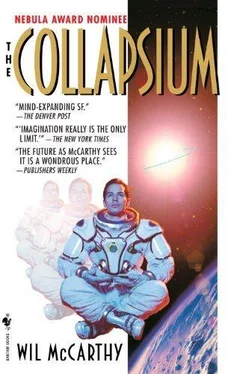Bruno couldn’t help sizing her up: tall and sturdy, quick, self-assured. But something told him she was maybe a little bit hollow inside. Unfulfilled? She reminded him of a weaver woman he’d known in Girona: Margaret something. Master of a craft that was widely admired and very much in demand, but difficult and rather dull in the practice. “The prison of my talent,” she’d often called it. Margaret’s frustration had always seemed a terrible shame to Bruno, but if people could choose their abilities he supposed the world would drown itself in athletes and guitar players and raunchy but lovable sex artists. If you had a job you were good at and appreciated for, well, sometimes that had to be enough.
He bowed.
“Doubly honored,” Deliah said nervously. “Brushes with greatness, oh my. I’ve had this department for eight years, but this is the month people choose to notice.”
“Naturally,” Tamra said.
“I’m to take you to Declarant Sykes,” Deliah added, casting a glance in the direction she’d come from. “Unfortunately, the station’s only fax gate is on the opposite end from the instrument room. It’s a bit of a walk.”
“Marlon is mucking with instruments again?” Tamra asked in a disapproving tone.
“Urn, well, we’ve been tuning the revpics, trying to bring the frequencies up. It’s slow work.”
“And rather beneath your rank,” Tamra observed, falling into step behind her.
“Perhaps, yes.”
The hum of machinery followed them as they walked.
“Well,” Bruno said, “it’s a very formidable station you have here. There are hundreds of others just like it?”
“That’s so.”
Bruno couldn’t help but be impressed. Projects like this one, however ill fated, bespoke a Queendom far bolder, far wealthier and more ambitious, than the one he’d left. With death a hunted quality, faxed away with every minor journey, perhaps civilization was finally able to take a longer view. Was it easier to make such pipe dreams come true when the benefits were for the builders themselves, rather than some hypothetical “posterity?”
He traced his hand along an enormous and unpleasantly warm resistor.
“The main beam holds up the collapsiter. I’m guessing its complement is anchored to a star?”
Deliah turned and smiled at him, as if the question pleased her. “Several stars, actually. It’s like sinking tent stakes into sand—the more you distribute the load, the less slippage you get.”
“Ah. Of course.”
“Partly my own idea, I’ll confess. After all, we don’t want to spend all our time tightening the, uh, tent cords.”
“Indeed.”
“It’s only for a few decades, anyway, until the ring is self-supporting, like a bridge. That’s the only reason we can do it this way. We couldn’t build a permanent structure of gravity beams—the anchor stars would all crash together eventually.”
“Obviously, yes,” Bruno agreed, then wondered if his tone weren’t a bit overbearing or dismissive. “I, uh, see you’ve worked out all the details.”
That comment clearly didn’t please Deliah van Skeltering. Of course, yes, because she hadn’t worked everything out, had not managed to prevent this newest disaster. Would she feel his words to be an insult? Bother it, people were so damned easy to offend. Especially the friendly ones. As always, Bruno could be offensive without lifting a finger.
“The Declarant’s social skills don’t see much use these days,” Tamra said, touching both Bruno and Deliah on the shoulder. She sounded amused, though not entirely patient about it. “Do please forgive him.”
“No, he’s quite right,” Deliah sighed. “Patience and mathematics. Patience and mathematics. If I’ve learned anything from his example, it’s that. If I’ve learned anything.”
“Here now,” Bruno protested. Many notions could be drawn from his example, surely, but he’d hate to count self-pity among them. “Mistakes happen, young lady. Don’t blame me for blaming you, because I haven’t. If, at some point, I do blame you, you’ll know it unambiguously. As you see, I’m not a subtle man.”
Deliah ducked her head. “Of… course, Declarant. Forgive me.”
“Oh, none of that,” he said, waving a hand. “I won’t hear of it; you’ll have us tied in knots. So you’re the director around here, are you?”
“For eight years now, yes.”
“And you say you’ve had no other problems?”
“Major ones? There are always problems—”
He waved a hand. “Of course, of course. I’m not grilling you; I’m just, er, making conversation. Since it appears we’ll be working together.”
“Ah. Well, for what it’s worth, I came to physics fairly late in life. And management. I’m from Africa.”
Bruno wasn’t sure what to make of that. “Is where you’re from a significant factor here?”
She gave an uncomfortable laugh. “It can be, yes. Growing up on a photocollector farm, you don’t think about much beyond the weather, the maintenance, and maybe a strong boy or two who’ll keep the dust off and laugh at your jokes. But University changes you—that is its purpose, I suppose.”
“Changes you? Leads you toward the sciences, you mean.”
“Toward the management of sciences, yes. What a shock, to discover I was a shepherd of physicists! By my second year at KSPAI was the department gopher, organizing all the home conferences, and eventually all the conferences all over the solar system. My grades were good, too, and my thesis did win that prize. Suddenly I was ‘Laureate van Skeltering,’ right when my kiddie marriage was falling apart and I needed a fresh start anyway. But from the moment I hit the job exchange, it was clear I was headed for administration, not math.
“Knowing the material is fine—it’s common—but it’s hard for one person to really move the world. Even you needed a cast of thousands in the end, Declarant, if I may say so. Turning prototype to product to end-user installed base is the real test of an idea, and knowing how to pull a team together—and hold them together when the going gets tough— is the key to that.”
Bruno could hardly argue with that; if everyone were like him, there’d probably be no commerce or progress at all, at least in the conventional sense.
“And yet,” Bruno said, groping to understand her point, “you’re still surprised to find yourself here. Far from Africa, among monarchs and Declarants, plotting the salvation of a star and all its worlds.”
“Exactly.” Deliah nodded once, emphatically.
He cleared his throat. “You, ah, do realize that the rest of us feel that way too? I myself grew up in the apartment above a little Spanish tavern.”
“I know,” she replied quickly.
Well of course she did. She’d already admitted to being an admirer, and Bruno’s life was in the public domain, open to all possible scrutiny. All at once, he was uncomfortable again, feeling exposed. Feeling far from his home, wherever that might be.
“Life is full of surprises,” he added, more sourly than was probably wise.
Suddenly, they were at the instrument room, a narrow closet Bruno might almost have missed if a pair of silk-trousered legs hadn’t been poking out of it. The walls and ceiling were of wellstone; a panoply of dials and gauges and keyboards and graphical displays raced and oozed and flickered around the flat surfaces, whose composition bubbled cubistically between metal and porcelain and various forms of plastic.
“What happened?” Deliah demanded of the legs. She was eyeing the wellstone surfaces with tired exasperation. Then, more respectfully, she said, “Can I help, Declarant?”
Читать дальше












